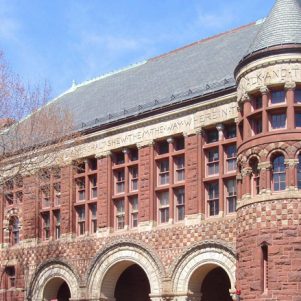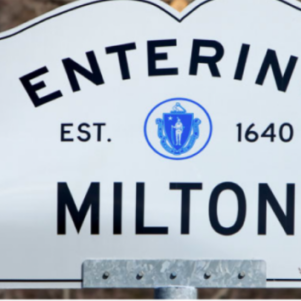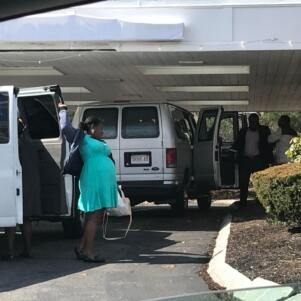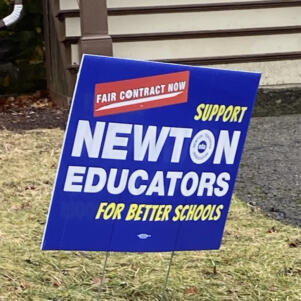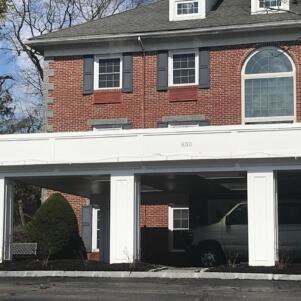Unions picketing hotels in Verizon strike prompt court move
By Evan Lips | May 23, 2016, 16:24 EDT
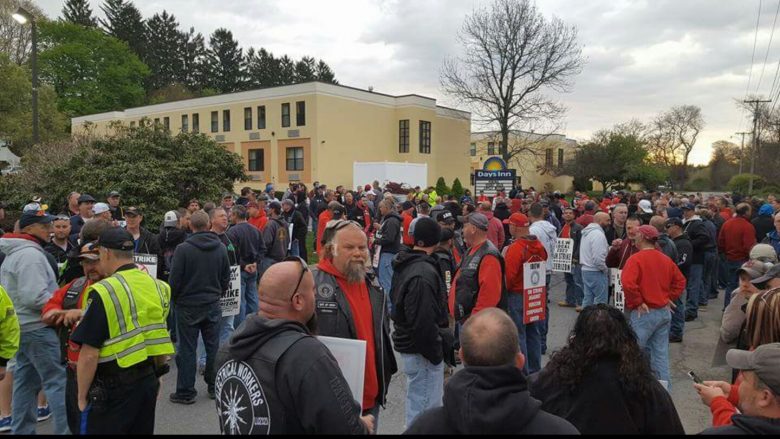 Picketing at a Days Inn May 9 in Middleborough, Mass., targeting Verizon strikebreakers used to replace workers who walked out last month. (Union member’s photo courtesy of the U.S. District Court in Boston)
Picketing at a Days Inn May 9 in Middleborough, Mass., targeting Verizon strikebreakers used to replace workers who walked out last month. (Union member’s photo courtesy of the U.S. District Court in Boston) BOSTON – The National Labor Relations Board on Monday sought a temporary restraining order against several labor unions which it said are orchestrating a campaign to harass area hotels currently housing out-of-town Verizon strikebreakers.
About 39,000 union workers walked off their Verizon jobs in mid-April after a series of failed contract negotiations with the local wireline telephone service provider. The workers handle landline, cable television and Internet access systems in nine Eastern states, including all of southern New England.
The federal labor-relations agency asked for the court order to stem what it termed “unlawful conduct” by members of unions, including the International Brotherhood of Electrical Workers, one of the striking unions.
“The threat of further unlawful conduct from the respondent is tangible, as the labor dispute is ongoing, and there are allegations of continuing picketing and threats,” the agency told the U.S. District Court in Boston, referring to a rolling wave of demonstrations and picketing at area hotels. “This illegal campaign may force Verizon to capitulate to respondent’s demands in the primary labor dispute.”
Verizon and leaders of the striking unions last week agreed to return to the bargaining table, the Associated Press reported on May 16, citing the U.S. Labor Department. The first session was set for last Tuesday over issues that include pensions, workforce reductions and health care costs.
In the meantime, the federal labor relations agency is asking the court to intervene to block disruptive picketing at hotels where strikebreakers have been put up.
The picketing has prompted hotel managers to ask strikebreakers to find new accommodations in several instances, according to the agency’s court filing, which includes an affidavit from a Verizon manager who oversees the replacement workers. The New England operations manager said one of her duties is to “coordinate with security personnel to get additional police presence when the hotels are discovered by the picketers.”
Citing managers of a Westborough hotel, the Verizon supervisor said they “explained that they were upset about the noise level at the early morning hours, the lack of police control and the disturbance being caused by the union.”
At a Springfield hotel, the manager said that “he had asked the contractors to leave the premises because 99 percent of his customers had complained about picketing,” according to the affidavit. It said that the picketers resorted to blowing air horns at 5:30 a.m.
The court filing also includes a letter from the Merrimack Valley-based local of the electrical workers union, saying it had been sent to a Best Western hotel in Chelmsford. The letter asks the hotel to “immediately stop giving aid and comfort to Verizon’s out of town replacement work force.”
“We will be conducting a large banner and leaflet campaign in front of your hotel,” the letter adds. “We will ask your customers and the general public to boycott your business,” it says. “We intend to conduct a continuous campaign aimed exclusively at your business, its customers and the general public.”
Verizon strikebreakers stayed at the Chelmsford hotel “for a few days before they were kicked out by the hotel’s management,” the company manager said in the affidavit.
In another sworn statement, a Verizon investigator says that picketers slashed the tires of trucks belonging to strikebreakers that were parked outside of a hotel in Nashua, New Hampshire.
“The contractors explained that as they moved up to where their trucks were, they had to push through a crowd of picketers and as they did so, they were being kneed, shoulder-checked and chest-bumped by the picketers,” the investigator said.
Amy Seifer, an assistant general counsel for Verizon, said in a prepared statement that the company is “pleased that the NLRB is seeking a temporary restraining order against IBEW for violations of the National Labor Relations Act.”
“The union has engaged in picketing and other coercive activities at hotels in New England– these acts have been aimed at harassing and driving out of these hotels Verizon managers, other replacement workers, and other hotel guests having nothing whatsoever to do with the current labor dispute,” Seifer added. “Picketers have caused guests to fear for their personal safety, have banged drums, used bullhorns, and shouted obscenities in the early morning hours, and have urged hotel management to evict Verizon guests.
“These businesses, and the customers they serve, should be free from the IBEW’s blatantly unlawful coercion.”
Mark Brueggenjohann, a spokesman for the electrical workers union, didn’t immediately respond to a request for comment on the company’s claims and filing.
Other testimony included accounts from hotel employees who said picketers harassed them and called them names, in addition to blocking parking lot entrances and exits. A replacement worker said that when he and other strikebreakers abandoned one hotel, picketers would “tail” them to the next.
The federal agency asked the court to bar electrical workers union members as well as those in other labor organizations “from engaging in picketing and other activities towards neutral parties for a five-day period.” The agency said it was “ necessary due to the egregiousness of respondent’s actions, including the confrontational and highly disruptive picketing of neutral hotels.”
“These actions have had a substantial impact on interstate commerce,” the agency contends in the filing. “Respondent has not made it clear that the dispute is with Verizon rather than the hotels because the fliers, signs, and statements target the hotels.”
Verizon first contacted the agency about the hotel picketing on May 11, court records show.
As of Monday afternoon, Judge Denise J. Casper had not ruled on the request. A federal judge overseeing a similar case in New York issued a temporary restraining order on May 9 against the Communication Workers of America, another striking union.
Read a copy of the NLRB’s petition application here:

